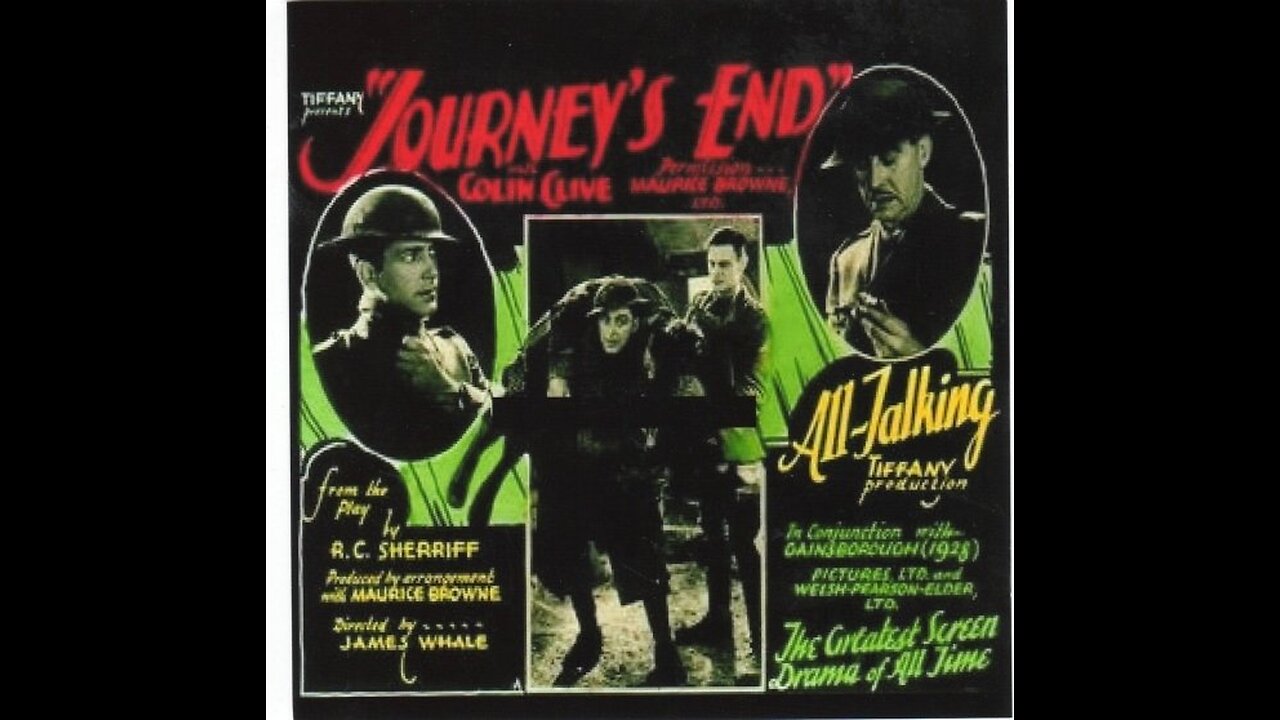Premium Only Content

JOURNEY'S END (1930)
JOURNEY'S END is a 1930 war film directed by James Whale. Based on the play of the same name by R. C. Sherriff, the film tells the story of several British army officers involved in trench warfare during the First World War. The film, like the play before it, was an enormous critical and commercial success and launched the film careers of Whale and several of its stars.
The following year there was a German film version The Other Side directed by Heinz Paul starring Conrad Veidt as Stanhope and Wolfgang Liebeneiner as Raleigh. The film was banned just weeks after the Nazis took power in 1933.
In 1976, the play was adapted again as Aces High with the scenario shifted to the British Royal Flying Corps. The play was adapted for film again with its original title and scenario in 2017.
Plot
On the eve of a battle in 1918, a new officer, Second Lieutenant Raleigh, joins Captain Stanhope's company in the British trench lines in France. The two men knew each other at school: the younger Raleigh hero-worshipping Stanhope, while Stanhope has come to love Raleigh's sister. But the Stanhope whom Raleigh encounters now is a changed man who, after three years at the front, has turned to drink and seems close to a breakdown.
Stanhope is terrified that Raleigh will betray his decline to his sister, whom he hopes to marry after the war. An older officer, the avuncular Lieutenant Osborne, desperately tries to keep Stanhope from cracking. Osborne and Raleigh are selected to lead a raiding party on the German trenches where a number of the raiders are killed, including Osborne. Later, when Raleigh, too, is mortally wounded, Stanhope faces a desperate time as, grief-stricken and without close friends, he prepares to face another furious enemy attack.
CAST:
Colin Clive as Captain Denis Stanhope
Ian Maclaren as Lieutenant Osborne
David Manners as Second Lieutenant Raleigh
Billy Bevan as Second Lieutenant Trotter
Anthony Bushell as Second Lieutenant Hibbert
Robert Adair as Captain Hardy
Charles K. Gerrard as Private Mason
Tom Whiteley as Sergeant Major
Jack Pitcairn as Colonel
Werner Klingler as German prisoner
Gil Perkins as Sergeant Cox
Leslie Sketchley as Corporal Ross
PRODUCTION:
When Howard Hughes made the decision to turn Hell's Angels into a talkie, he hired a then-unknown James Whale, who had just arrived in Hollywood following a successful turn directing the play Journey's End in London and on Broadway, to direct the talking sequences; it was Whale's film debut, and arguably prepared him for the later success he would have with the feature version of Journey's End, Waterloo Bridge, and, most famously, the 1931 version of Frankenstein. Unhappy with the script, Whale brought in Joseph Moncure March to re-write it. Hughes later gave March the Luger pistol used in the film.[1]
With production delayed while Hughes tinkered with the flying scenes in Hell's Angels, Whale managed to shoot his film adaptation of Journey's End and have it come out a month before Hell's Angels was released. The gap between completion of the dialogue scenes and completion of the aerial combat stunts allowed Whale to be paid, sail back to England, and begin work on the subsequent project, making Whale's actual (albeit uncredited) cinema debut, his "second" film to be released.
-
 21:23
21:23
SLS - Street League Skateboarding
12 days agoLuan Oliveira's Top SLS Moments: 2015
2.51K -
 12:16
12:16
Cowboy Kent Rollins
6 days ago $1.22 earnedFried Onion Burger | Famous Oklahoma Fried Onion Burger Recipe
19.4K5 -
 LIVE
LIVE
Dr Disrespect
3 hours ago🔴LIVE - DR DISRESPECT - WARZONE - HOW TO WIN SOLO GAMES
2,656 watching -
 UPCOMING
UPCOMING
Crypto Power Hour
2 hours agoThe Wicked Witch Is Dead, New Leadership At The SEC |EP15
62 -
 UPCOMING
UPCOMING
Jeff Ahern
26 minutes agoNever Woke Wednesday with Jeff Ahern
-
 44:55
44:55
BEK TV
15 hours agoTARIFFS, TECH TYRANNY, AND PROPHECY: CLAY CLARK EXPOSES THE GLOBAL RESET NO ONE IS TALKING ABOUT
3.9K -
 1:20:27
1:20:27
Russell Brand
3 hours agoMaha Revolution: RFK Jr. Declares War on Toxic Food and Pharma – SF571
100K24 -

Tucker Carlson
4 hours agoGeorge Friedman Predicts the Next 50 Years of Global Affairs and the Importance of Space Domination
57.1K26 -
 1:01:42
1:01:42
Sean Unpaved
2 hours agoNBA Series Standoff, Draft Day Drama, & Uncle Shay's Shocking Controversy
24.5K -
 1:56:11
1:56:11
The Charlie Kirk Show
2 hours agoWhat's The Matter With Boomers? + Don't Die for Dyes + SCOTUS Showdown | Means, Murtaugh | 4.23.25
42.5K28